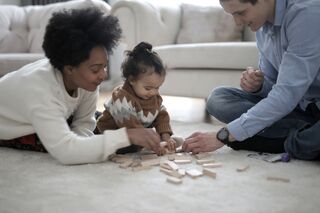Confidence
Let Your Children Practice Solving Their Own Dilemmas
Parent traps: What are they and how do we avoid them?
Posted August 11, 2022 Reviewed by Michelle Quirk
Key points
- Parents are good at solving problems, but we need to let our children learn to do it themselves.
- Parent traps: We know we can make our children feel better quickly but we should let them try to do it themselves.
- Try not to rob your child of an opportunity to solve their own problems.
As parents, we want the best for our children. We want to provide them with guidance, support, and instruction to develop into caring and confident adults. Yet, parents all across the country are also getting the message that “It is a tough world out there” and that their children need to have every advantage so they can become competitive in the college and job market.

Parents Solving Their Children's Problems
A parent trap is a situation in which parents are drawn to solve problems for their children or rescue them in a way that ultimately stifles growth opportunities. I have seen many parent traps in my practice as a family therapist, where parents work harder than their children to solve their children's dilemmas or problems.
Of course, you want to assist your child in every way you can, but there need to be limits. The difference is in whether you are giving your children advantages or assisting them in developing the skills that will put them at an advantage. When parents set everything up for their kids, they lose the chance to learn to do things on their own, which ultimately puts them at a disadvantage. On the other hand, when parents assist their children in developing skills so they can gain those advantages themselves, their children truly enter the adult world ahead of the game. With the pressure so strong in this generation, parents often fall into the trap of solving problems rather than assisting.
It is so easy to fall into parent traps. The allure of the traps is that parents want to do the best for their kids. We have lots of experience in solving problems, we know we can make our children feel better right away, and we hate to see them sad or suffering. However, if we always jump in and fix everything, how will our children learn to solve their own problems? The goal is for our children to develop the confidence that if a problem arises they know they have the ability to come up with solutions. They will only get this sense of confidence if they get the practice.
Another way to think about this is in terms of resiliency. Resiliency is the word we use to describe someone that has the self-confidence and skills to overcome adversity without it being problematic or traumatic. We all want this for our children.
Academics and Social Relationships
Everyone agrees that one of the best lessons a child can learn is the ability to think and problem-solve on their own. Childhood is full of opportunities to routinely practice these skills, but there are two areas in which parents often fall into the trap of rescuing their children from their struggles: academics and social relationships. Parents often get caught up in the hysteria that every grade and every assignment will impact their child’s chances of getting into a choice college. This fear leads parents to attempt to rescue their children, which results in parents avoiding very important teaching opportunities. When parents provide children with the solutions to academic dilemmas such as low grades, missing homework, or poor attitude in class, they are teaching them that problems are solved by asking someone else for the solution.
Instead of focusing on a quick fix just to raise grades, which might not be deserved if the parent does the homework, a parent could focus on the child's lack of effort, planning, and responsibility. This student would then experience the natural consequences of getting a low grade in the class, such as loss of privileges until their grade is brought up. The parents could then discuss how to do it differently the next time rather than fix it themselves. Help your child practice their new skills or study habits rather than doing it for them.
Another area we see parents commonly falling into a parent trap is when they see their children struggling with their peers. Whether it is a simple peer conflict or parents feel like their children are being excluded, even the most well-intentioned parents find themselves trying to resolve their children’s peer issues rather than letting them work the issues out on their own or helping their children come up with a resolution.
If parents are always in charge of their children’s social calendars, it doesn't help them learn to develop friendships on their own. This trap applies as much to preschool play groups as it does to adolescent dating habits. Parents have ideas about what they want their children’s social life to look like, but that may not be in line with their children's interests. In the short term, the child may feel included, but in the long term, the child hasn't learned the social skills needed to make and keep friends. A parent’s role is to guide their children and teach them how to maintain friendships, not to do it for them.
Parent traps are tricky because, in the short term, it feels great to make your child feel better. However, it will feel even better for both of you when you teach your child how to resolve common social issues on their own. As parents, we have had a lot of practice solving problems, and it may come easy to us. Children, however, need opportunities for their own practice. Instead, parents should give their children the opportunity to rescue themselves and become their own problem solvers. The byproduct of solving your own dilemmas is the development of self-confidence, which is a skill we want all of our children to have.


